Knox Stories
Repertory Theatre Term Performs 20th Season
The 2025 season marked the 20th Repertory Theatre Term season at Knox College
Venture Boldly

Office of Communications
2 East South Street
Galesburg, IL 61401

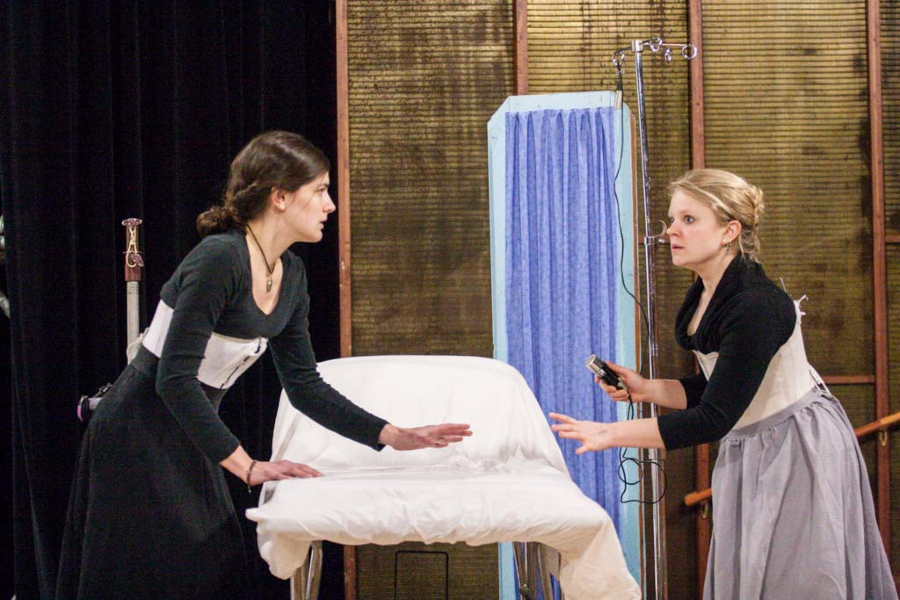
by Nicole Acton '16
The Department of Theatre's winter production, In the Next Room (or the vibrator play) by Sarah Ruhl, gave students the opportunity to connect what they learn in the classroom with what they experience on and behind the stage. Through Honors projects, independent studies, and classes offered winter term, students were able to earn academic credit for their work on the production.
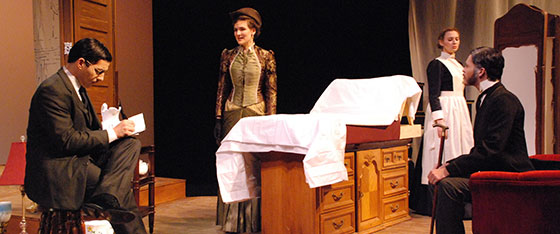
Co-costume designer Hannah Compton pursued two independent studies in conjunction with her work on the production. Fall term, she delved into the costume shop's vintage collection, studying Victorian and bustle-era fashion. "My independent study fall term really informed my construction techniques and helped me build a vocabulary for winter term's build," said Compton, whose winter term independent study focused on the design process itself. Pictured below are three costumes that Compton helped to design and build.
Compton, who will graduate in June, is preparing to enter the professional world of costume design and construction. "Co-designing a period main-stage taught me a lot about the challenges facing designers on a large scale, extensive build," said Compton. "This experience was crucial to my education as I prepare to enter the world of theatre."
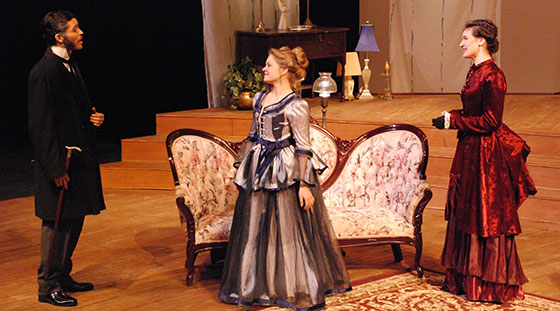
Senior Rebekah Heusel, pictured below at a rehearsal, earned academic credit for her work as stage manager for In the Next Room, which she sees as the culmination of all she has learned at Knox. Having worked as a stage manager and production/project manager at Chicago regional theatres, Heusel already had extensive knowledge of stage management. Rather than a learning experience, she sees her work on In the Next Room as a teaching experience as she trained new stage managers.
"I gained a lot of insight into the minute details of the job," she said. "Working in that type of environment had me observe and rethink my own management/organizational quirks and gave me a better understanding of what I need to improve on."
In the fall, Heusel will pursue an MFA in stage management at the Yale School of Drama.
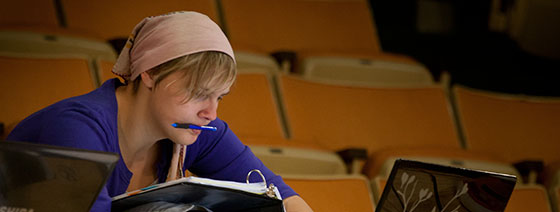
For senior Allison Diamond, In the Next Room was the inspiration for an Honors Project in dramaturgy. Diamond researched the emergence of electricity, including the use of vibrators during the Victorian era. Her historical research guided the production team as they replicated the dawn of electricity onstage, even providing examples of historical vibrators from the era. Below, Diamond presents her research at a Horizons event.
"Having an entire credit dedicated to the dramaturgical research every term allowed me to lend greater focus to the material," said Diamond. "This experience has helped me practice and hone the craft which I will be using in my professional life."
After Knox, Diamond hopes to pursue a career in literary or artistic management.
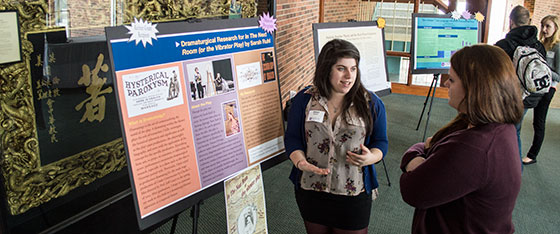
Two of the show's lead actresses, Rose Dolezal and Grace Moran, were enrolled in the Period Style Acting class while participating in the production. Taught by Elizabeth Carlin Metz, Smith V. Brand Endowed Chair in Theatre Arts, the class gave students the opportunity to put into practice what they were learning in the classroom. Below, the two actresses help each other with their corsets as they learn to move naturally in period costumes.
"Teaching Period Style concurrently with the play was a great intersection between the classroom and the stage," says Metz. "It helped students to take the physical work further and to understand how characters are social constructions relative to culture."
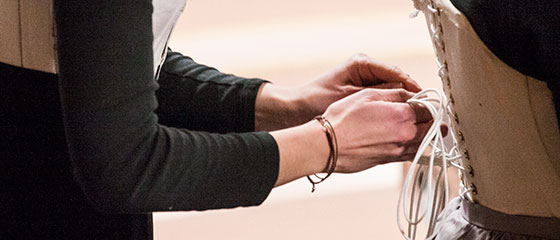
At Knox, such academic involvement in theatrical productions is the norm. According to Metz, theatrical production at Knox is not extra-curricular, but co-curricular. "Because the work we do in production is directly tied to the classroom, production is considered the laboratory of the classroom," says Metz.
Knox productions seek to replicate the professional process, but the first goal, according to Metz, is that her students are given the opportunity to learn and the freedom to fail before they emerge into the professional world of theatre.
"The learning curve we witness over the course of four years is profound," she says. "An artist's life is always one of learning and growing, and that process starts here. The many students we have seen go on to professional careers are evidence of that."

Published on April 10, 2014